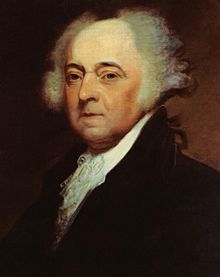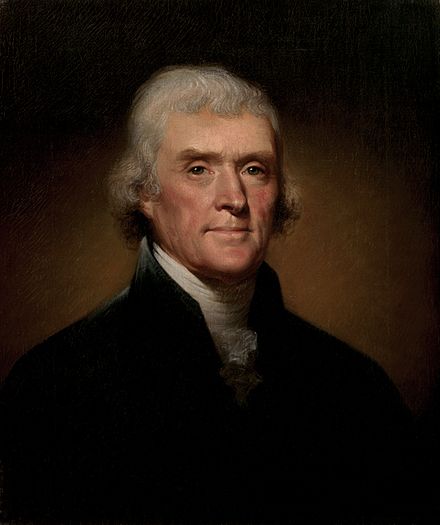
 Below is my column at Fox.com on this Fourth of July and what we can learn from the Framers — not just at the beginning of our nation but at the end of their lives. This is also the date of the passing of Thomas Jefferson and John Adams. Their renewed friendship in their final years should be a lesson in itself for all of us during this age of rage.
Below is my column at Fox.com on this Fourth of July and what we can learn from the Framers — not just at the beginning of our nation but at the end of their lives. This is also the date of the passing of Thomas Jefferson and John Adams. Their renewed friendship in their final years should be a lesson in itself for all of us during this age of rage.
Here is the column:
For many of us, the Fourth of July is a favorite holiday as families gather around barbecues and picnic blankets to this quintessential American experience. Yet, in the midst of the food, fireworks and friends, it is also a holiday to reflect, if only briefly, on what brings us to this moment each year in celebration of the Declaration of Independence.
This year, the holiday seems even more important. The core values that define us as a people are again under attack, particularly the right that defines us as a people: free speech.
In my book, “The Indispensable Right: Free Speech in an Age of Rage,” I discuss our struggle with free speech through the stories of the heroes and villains of our Republic. Two of those figures, John Adams and Thomas Jefferson, also happened to die on this date.
Adams and Jefferson were fierce political enemies who would rekindle their friendship in their final years before they both died on the very same day, July 4, 1826. Jefferson died first at Monticello, Virginia, around noon, He was 83. A few hours later (without knowing of his friend’s death), Adams passed away in Quincy, Massachusetts, at the age of 90.
In his 1826 eulogy for both men, Daniel Webster (like many in the country) could not escape the weighty significance of the date of their mutual passing or accept that it was mere coincidence. For Webster, it was “Providence” that “the heavens should open to receive them both at once.”
As explored in my book, Adams and Jefferson are complex figures who displayed some of the same doubts about core rights that many today harbor. While they would be unlikely to declare our Constitution “trash” on MSNBC or demand that we “reclaim America from constitutionalism,” they had their own crises of faith.
Adams displayed the most shocking collapse in faith after he became president. The man who praised the “Dignity, Majesty, [and] Sublimity” of the Boston Tea Party, immediately turned on his political opponents with a crackdown under the infamous Alien and Sedition Acts. Even members of Congress were not immune from the arrests as he met citizen rage with state rage.
James Madison and Jefferson were appalled by the attack on free speech and even used code in letters to protect their own communications. Madison referred to these prosecutions as the “monster” that dwells within our legal system, emerging during times of fear or anger.
Jefferson would ultimately pardon those convicted under Adams. Yet, he would also yield to that “monster” in using the criminal system to target his own critics, though to a lesser extent as his predecessor.
The story of Adams and Jefferson should seem all too familiar to many today in this presidential election. Jefferson ran against Adams in 1800 on his crackdown of free speech and his use of the criminal justice system against his opponents. He won in part on the issue of free speech, a lesson that should not be lost on Donald Trump, Robert F. Kennedy, Jr., Jill Stein, Chase Oliver and Cornel West.
If they want history to repeat itself in November, they should make free speech a central issue in their campaigns. Joe Biden is undeniably the most anti-free speech president since Adams in his support for an unprecedented censorship system that a federal court called “Orwellian.”
Yet, there is a broader lesson for the rest of us. Our country in 1800 was as divided and angry as it is today. Indeed, these politicians were not just talking like they wanted to kill each other, they were actually trying to kill each other with the use of sedition prosecutions. Jefferson referred to Adams and his Federalist administration as “the reign of the witches.” Federalists denounced Jeffersonians as “Jacobins” and “traitors.”
Today President Biden and his allies are declaring that democracy will end if Trump is elected and that he will, according to MSNBC host Joe Scarborough, “throw away” democracy. On ABC’s “The View,” host Whoopi Goldberg warned journalists and “gay folk” that Trump is planning to round them up and “disappear you.” Former Rep. Liz Cheney, R-Wyo., warned that, if Trump wins, this “may well be the last real vote you ever get to cast.”
Back then, the rhetoric was equally overwrought. Media was also openly biased and Federalist newspapers declared that “Murder, robbery, rape, adultery, and incest will be openly taught and practiced, the air will be rent with the cries of the distressed, the soil will be soaked with blood, and the nation black with crimes.”
Conversely, a Jeffersonian writer warned that, if the Federalists were elected, “chains, dungeons, transportation, and perhaps the gibbet” awaited citizens. Others predicted that under Adams they “would instantaneously be put to death.”
So our Constitution and Bill of Rights were written not just for times like our own but in a time like our own.
However, something happened. We came together as a nation. Indeed, in their final years, these two fierce enemies would exchange warm letters and reestablish their friendship and mutual respect.
That may be the greatest lesson of all. If John Adams and Thomas Jefferson could find a core shared identity as Americans, there must be hope for the rest of us. All of the political tensions and animus that followed in our history pales in comparison to that one transcendent moment when we declared as a people that we would be free.
It was a shared moment for Adams and Jefferson that would rekindle as friendship. At the very end of their lives, they remembered who they were and what they meant to each other. It is a moment still shared by all Americans. It reminds us that what we have in common as a free people is far greater than what divides us.
So Happy Fourth of July to us all.
Jonathan: There are other “core values” that are important–the principle in our Founding documents that “no man (or woman) is above the law”. The Founders rejected the idea of an authoritarian monarch. Yet, just 3 days before our 4th of July celebration Chief Justice Roberts and the right-wing majority of the Court declared a president is immune from criminal prosecution for all “official acts”. As Justice Sotomayor said in her dissent, the majority is saying the president is “a king above the law”.
DJT has a plan for his second administration. It’s contained in “Project 2025” that lays out in detail his plan. It involves gutting the DOJ and other agencies of any public servant who might try to exercise their “free speech” rights. They will be replaced by DJT loyalists.
Kevin Roberts, the president of the right-wing Heritage Foundation, helped put together “Project 2025”. Roberts was on Steve Bannon’s “War Room”, the day after Bannon went to prison, and declared he envisions “taking the country back” from the “leftists” and “liberals” in the Biden administration. But he went further: “We are in the process of a second American Revolution, which will remain bloodless if the left allows it to be”. Roberts was plain–any protests against “Project 2025” will be put down with violence.
Roberts plan for a second DJT administration looks very much like what happened in Germany under the Weimar Republic. Hitler was made Chancellor in 1933 through a blood-less coup–and agreement between Hindenburg, Von Papen and Germany’s major industrialists. They thought they could control Hitler. But once in power Hitler and the Nazis consolidated that power by purging the government of any opposition, the “communists”, “socialists” and “liberals”. Their were violent protests against Hitler’s authoritarian rule. They were brutally put down. A lot of opposition figures were either prosecuted before Nazi judges, jailed, killed or fled into exile. Hitler declared “I am the law”. And after Hitler was finished there was no one left to oppose him.
Could the same thing happen if DJT regains power? He has already said he will charge Liz Cheney with “treason”. He also wants to prosecute Joe Biden, Jack Smith and others who have prosecuted him. DJT thinks the right-wing majority on the SC will support whatever actions he takes against his enemies–because as President all that would be treated as “official acts”.
James Singer, a spokesperson for the Biden campaign, put the threat in stark relief on Tuesday: “248 years ago tomorrow, America declared independence from a tyrannical king, and now Donald Trump and his allies want to make him one at our expense, they are dreaming of a violent revolution to destroy the the very idea of America”.
If the democratic Weimar Republic could fall under the Nazi onslaught what is prevent the same thing from happening here? It appears only the voters in November can now decide the issue.
Since today, the DOJ, the FBI, the intelligence agencies, academia and the MSM are full of Democratic loyalists I’m not sure what the difference will be to us plain folks?
Adams and Jefferson didn’t have the technology to use Cointelpro style blacklisting to bypass court oversight. Today is far more dangerous.
We can learn hypocrisy from them, especially from Jefferson. While “all men are created equal”, they are not born equal. Certainly not in Jefferson’s slave quarters, where all men were born into live-long slavery.
Our Creator has endowed no one, ever, with unalienable Rights of “Life, Liberty and the pursuit of Happiness.” Biblically, that is pure nonsense, found no where in the Bible as being spoken by God or His Son, or even any of the apostles. Ask Paul, for example, about his experiences with life and liberty and pursuing happiness.
These were difficult goals to achieve , but worth pursuing . Both Jefferson an Oppenheimer were polymaths and polygots struggling each with an extremely difficult problem. Jefferson wanted a free country and to end slavery peacefully . He wasn’t worried about the north freeing it’s slaves because there were few , but he worried constantly about achieving it below Richmond , VA. The economy mostly supported by cotton , tobacco , peanuts and pine lumber industries with some hardwoods . A near impossible task to do peacefully . Go back and look over this era more carefully?
Secession was not prohibited and was fully constitutional. Southern states must have seceded as they legally decided. Reprehensible slavery was untenable and “withering on the vine” throughout western countries. Southern states would have failed and reunited. Freed slaves could not have been admitted to become citizens per existing law and must have been safely and compassionately repatriated, as is the choice of all abductees.